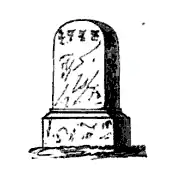| Millennium: | 2nd millennium |
|---|---|
| Centuries: | |
| Decades: | |
| Years: |
| 1413 by topic |
|---|
| Arts and science |
| Leaders |
|
| Birth and death categories |
| Births – Deaths |
| Establishments and disestablishments categories |
| Establishments – Disestablishments |
| Art and literature |
| 1413 in poetry |
| Gregorian calendar | 1413 MCDXIII |
| Ab urbe condita | 2166 |
| Armenian calendar | 862 ԹՎ ՊԿԲ |
| Assyrian calendar | 6163 |
| Balinese saka calendar | 1334–1335 |
| Bengali calendar | 820 |
| Berber calendar | 2363 |
| English Regnal year | 14 Hen. 4 – 1 Hen. 5 |
| Buddhist calendar | 1957 |
| Burmese calendar | 775 |
| Byzantine calendar | 6921–6922 |
| Chinese calendar | 壬辰年 (Water Dragon) 4110 or 3903 — to — 癸巳年 (Water Snake) 4111 or 3904 |
| Coptic calendar | 1129–1130 |
| Discordian calendar | 2579 |
| Ethiopian calendar | 1405–1406 |
| Hebrew calendar | 5173–5174 |
| Hindu calendars | |
| - Vikram Samvat | 1469–1470 |
| - Shaka Samvat | 1334–1335 |
| - Kali Yuga | 4513–4514 |
| Holocene calendar | 11413 |
| Igbo calendar | 413–414 |
| Iranian calendar | 791–792 |
| Islamic calendar | 815–816 |
| Japanese calendar | Ōei 20 (応永20年) |
| Javanese calendar | 1327–1328 |
| Julian calendar | 1413 MCDXIII |
| Korean calendar | 3746 |
| Minguo calendar | 499 before ROC 民前499年 |
| Nanakshahi calendar | −55 |
| Thai solar calendar | 1955–1956 |
| Tibetan calendar | 阳水龙年 (male Water-Dragon) 1539 or 1158 or 386 — to — 阴水蛇年 (female Water-Snake) 1540 or 1159 or 387 |

Year 1413 (MCDXIII) was a common year starting on Sunday (link will display the full calendar) of the Julian calendar.
Events
January–December
- March 21 – Henry V becomes King of England following the death of his father Henry IV.[1]
- July 5 – Battle of Çamurlu: Mehmed I defeats his brother Musa, ending the Ottoman Interregnum.
- August 28 – The University of St Andrews in Scotland is chartered by papal bull.[2]
- October 2 – The Kingdom of Poland and Grand Duchy of Lithuania sign the Union of Horodło.
Date unknown
- Samogitia becomes the last region in Europe to be Christianized.[3]
- The Annals of the Joseon Dynasty begin in Korea.
Births
- February 24 – Louis, Duke of Savoy (d. 1465)
- September 8 – Catherine of Bologna, Italian cloistered nun (d. 1463)[4]
- November 19 – Frederick II, Elector of Brandenburg (d. 1471)
- date unknown – Joanot Martorell, Spanish writer (d. 1468)
Deaths
- January 25 – Maud de Ufford, Countess of Oxford (b. 1345)
- March 20 – Henry IV of England (b. 1367)
- July 5 – Musa Çelebi, Ottoman prince and co-ruler of the Ottoman Empire
- September 26 – Stephen III, Duke of Bavaria (b. 1337)
- October 6 – Dawit I of Ethiopia (b. 1382)
- December 26 – Michele Steno, Doge of Venice (b. 1331)
References
- ↑ "Henry V". Oxford Reference. Oxford University Press. Retrieved February 15, 2020.
- ↑ Great Britain. Commission for Visiting the Universities and Colleges of Scotland (1837). University of St. Andrews. London: W. Clowes and Sons. p. 173.
- ↑ Bojtár, Endre (1999). Foreword to the Past: A Cultural History of the Baltic People. CEU Press. p. 140. ISBN 963-9116-42-4.
- ↑ "Saint Catherine of Bologna | Italian mystic". Encyclopedia Britannica. Retrieved February 15, 2020.
This article is issued from Wikipedia. The text is licensed under Creative Commons - Attribution - Sharealike. Additional terms may apply for the media files.